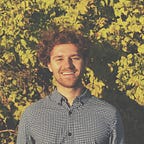How many books have you read?
Three weeks ago, I started my first full-time job. Fresh out of college, and eager to be successful in my new role, I hit the ground running. After a stressful job search, I was apprehensive to begin working. As a lifelong advocate of self-employment, the desire to transition from a college schedule that had placed boundaries on me for the previous four years, to a situation in which I was granted even less freedom was not something that I looked upon fondly.
But, so far, it has been incredible.
I have more money, more energy, and most importantly, more time. During college, it is extremely easy to feel productive, as pressing assignments, grades, and social activities command the majority of your waking hours. However, I have recently realized that on average, I actually spent very little of each day pursuing my own personal goals, in comparison to the time that I spent on school-related activities.
Now, during my downtime, I have the freedom to pursue whatever I choose. To me, this is a dream come true. I have more time to work out, play sports, and, most importantly, read books.
Around two years ago, I rekindled my love for the written word. Mostly due to finding a few ‘quake books,’ my life took a dramatic turn as I recognized that I was leaving a ridiculous amount on the table. I devoured a number of foundational books, and over time began to narrow down my concentration towards a small number of topics and authors. I dove headfirst into the world of the esoteric and haven’t looked back since.
My book count began to increase drastically, and my reading list began to grow at a similar, if not quicker pace. However, as time has progressed, and my knowledge has grown, I have become very conscious of the fact that, as Socrates summed it up,
“the only thing I know is that I know nothing.”
This realization added fuel to the fire that already existed. I have developed an intense pressure to grow and become successful — one of the ways in which I feel like I am doing so is by reading books that push me out of my comfort zone and onto the right path.
A few days ago, I was speaking with a friend about books. He asked me what I was reading at the time, and I mentioned that I had just finished Clayton Christensen’s How Will You Measure Your Life? He asked what it was generally about, which I then told him, however, the intricacies seemed to slip my mind. How was it that I had forgotten aspects of a book that I had just read? Did I have short term memory loss? Or, even more worrying, am I just stupid?
Hmm, probably.
This realization became extremely worrying. How much had I actually retained over the past two years? Had I basically just been looking at lines on a page, and not even inferred what they meant?
It wasn’t until a few days later that I finally had a realization. This drive that I had developed had pushed me to feel as though I needed to finish as many books in as short a time as possible. There was knowledge on the table, and no time to waste. I was reading at a very quick pace — whilst being great for finishing books, didn’t favor so well with my ability to recollect the information.
Now, I’m not pushing back against speed reading, which can be very effective when reading content that is very easy to digest, and requires only a general understanding to be attained (for example, a news article — you usually don’t need to know the intricacies of an event, rather simply what happened, why it happened, and what it means). But, when trying to read philosophy, for example, it is imperative that one lingers on the specific words that have been chosen, as they often offer multiple translations and understandings, which must not be taken at face value.
Combatting this problem, however, is very simple. You just have to slow down, and truly think about what you are digesting. Take out a pen and underline specific sentences that you want to revisit. Re-read pages to truly grasp the message being delivered. Put your pride aside, take your time, and enjoy the work of great men and women who have stories and experiences that could change your entire perspective.
This message has also been summed up, in a way much more coherent than I could ever accomplish, by Susan Hill.
“Fast reading of a great novel will get us the plot. It will get us names, a shadowy idea of characters, a sketch of settings. It will not get us subtleties, small differentiations, depth of emotion and observation, multilayered human experience, the appreciation of simile and metaphor, any sense of context, any comparison with other novels, other writers. Fast reading will not get us cadence and complexities of style and language. It will not get us anything that enters not just the conscious mind but the unconscious. It will not allow the book to burrow down into our memory and become part of ourselves, the accumulation of knowledge and wisdom and vicarious experience which helps to form us as complete human beings. It will not develop our awareness or add to the sum of our knowledge and intelligence. Read parts of a newspaper quickly or an encyclopedia entry, or a fast-food thriller, but do not insult yourself or a book which has been created with its author’s painstakingly acquired skill and effort, by seeing how fast you can dispose of it.”
And remember, “slow is smooth, and smooth is fast.”
